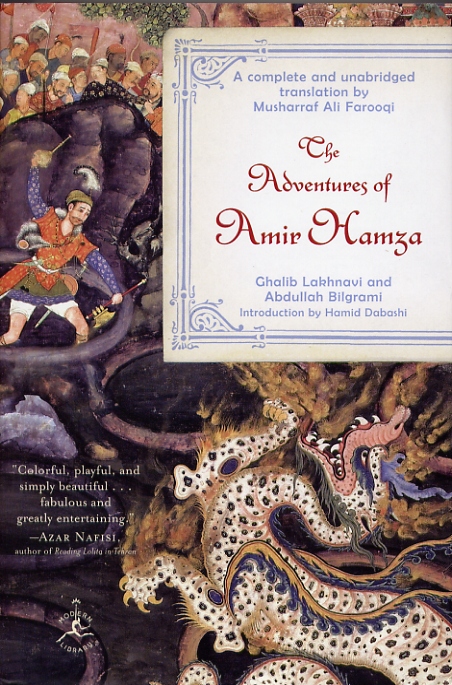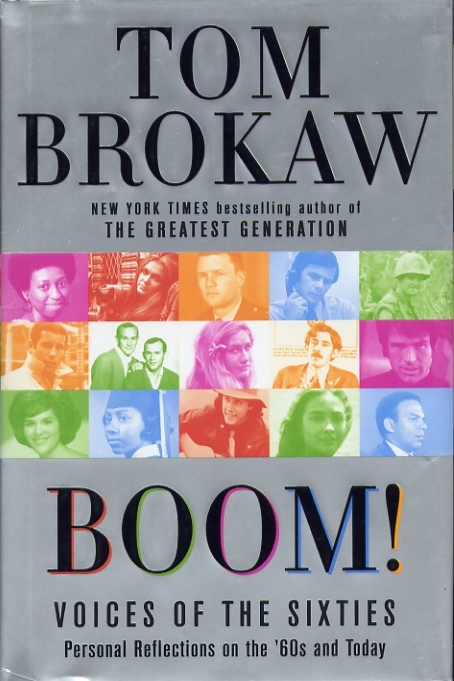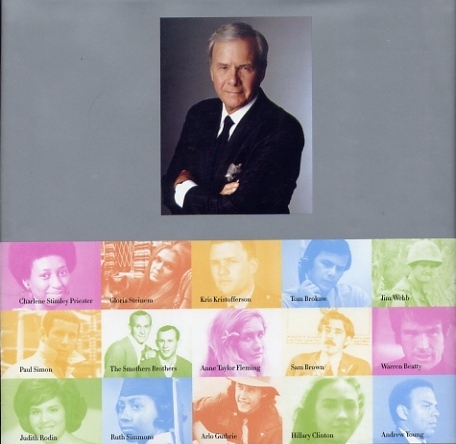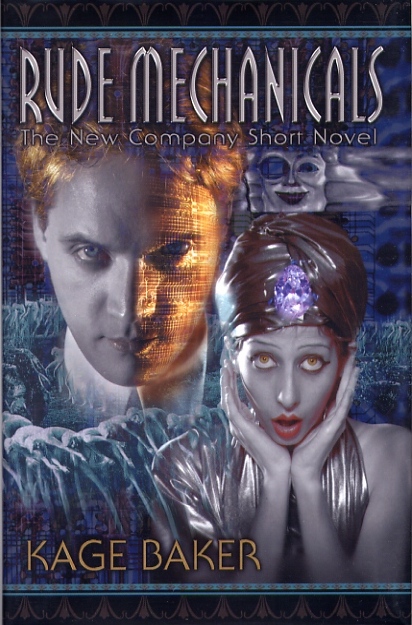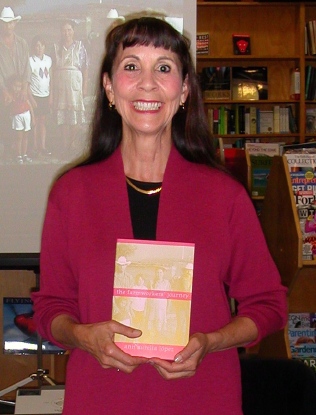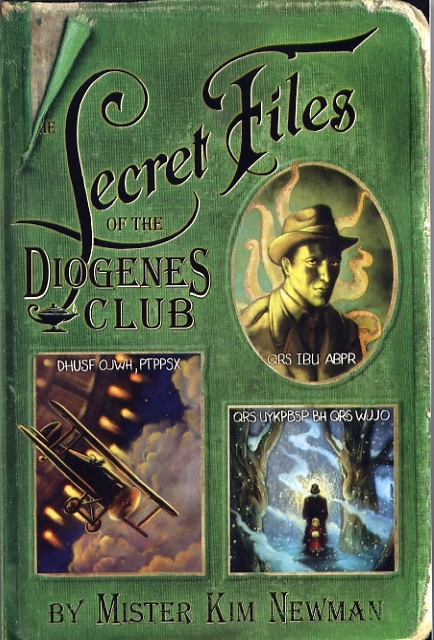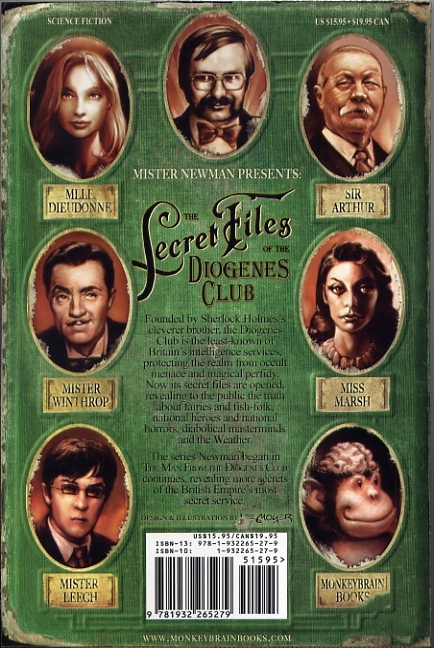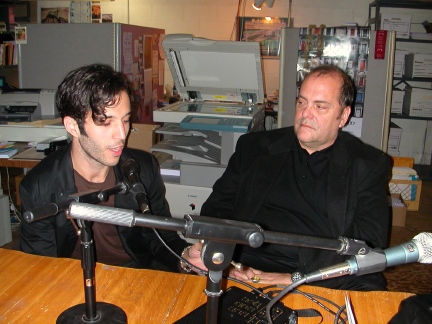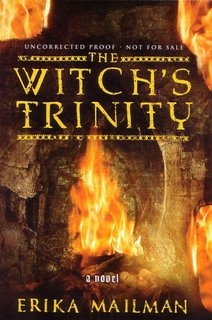|
|
|
|
This Just In...News
From The Agony Column
|
| |
|
11-09-07 : 'The
Adventures of Amir Hamza' ; Agony Column Podcast News Report : A
Conversation with Ed Thomas, Owner of Book Carnival
|
Time, Money
and Scholarly Fantasy
|
|
Oh
my, Kage Baker, JK Potter, Subterranean Press!
|
You go out there
to buy a book, even if it involves pointing and clicking, and there
are some serious calculations to be made. Serious – but pretty
simple. Your most valuable asset is time. That's why I'm here,
really. Toi make sure you spend your valuable reading time wisely,
even though that sometimes involves spending your money less than
wisely. And to make sure that you even know about some stuff that
just might pass well beyond your radar. 'The Adventures of Amir
Hamza' (Modern Library / Random House ; October 30, 2007 ; $45)
is something of a conundrum for me. I don’t know that it
is immediately worth your valuable time. At 952 pages, it's a long
book. But I do believe that it is worth your valuable money, which
is to say the least, odd. Let me explain.
'The Adventures of Amir Hamza' was originally written in the mists of time.
We're told that it comes from the seventh century. That is indeed a long
time ago. The book is a collection of fantasies about Amir Hamza, the uncle
of the prophet Muhammed. Over the centuries, the stories were spread by
oral tradition, performances even in art. They're pretty wild adventures,
with lots of swords, death, vengeance, some monsters, some tricksters,
just about everything you might find in your bog-standard elves-n-orcs
fantasy only done up in Persian style. The stories were first written down
and published in Urdu in 1855 as Dastan–e Amir Hamza by
one Ghalib Lakhnavi, a poet who worked in India and produced
exactly one book: this one. Abdullah Bilgrami enlarged
Lakhnavi's work in 1871, and that's all we can find of him. Maybe not a
such a good book to work on, since it seems to be life devouring. Pity
then, the translator for this edition, Musharraf Ali Farooqi,
though he at least was lucky enough to get other works published. Hamid
Dabashi got off comparatively easy, having just written the introduction.
As for those who created the website
for the book? Oh my. One had best simply send them your best prayer.
When you first open up this book, you’re going to feel like a character
in a Lovecraft story who's just stumbled onto a previously undiscovered
work by Abdul Alhazared. When you actually sit down to read it, well ...
It's not an easy read. And it is an incredibly long book. On the other
hand, what transpires is thoroughly delightful in terms of story and character.
If money is a concern and you only buy books you intend to read like immediately,
this is not the book for you. On the other hand, if you're a serious book
collector and particularly interested in scholarly fantasy, then this is
a must-buy. I don’t know what the print run is, but it can't be all
that grand. If the weight wasn't such that it might crush the average bedstand,
then this might be a great bedstand book. But damn, you know some twenty
years from now, these things might be a scarce as hen's teeth, or as easily
found as used copies of Frampton Comes Alive. It's hard to say,
but me, I'd prefer to err on the side of having it and not wanting it,
rather than wanting it and not having it. It is the rare case of perhaps
not worth your time, but certainly worth your money. You'll know if you
need to have this. Do you feel it tugging at you this moment? Are you scouting
for empty space on the shelves where you can stash it without the spouse
immediately taking note? Then this book is for you. I will warn you that
you might encounter a woman who is ravished by a magical horse. You might
encounter demons slavering to attack. Whatever it is that you find within
has journeyed to you through the centuries. It is the voice of the past
whispering in your ear. "I am worth your time," it says. "Give
me your time."
|
A Conversation
with Ed Thomas, Owner of Book Carnival : Hanging Out With Dean R.
Koontz
Today's Agony Column
podcast is a conversation with Ed Thomas, owner of Book
Carnival in the city of Orange, California. It's an unassuming little
place tucked into a fairly distressing strip mall, but damn – what
a selection! I bought boatloads of titles published by Dark Harvest there,
and that was where I first met Dan Simmons at a signing. Book Carnival
focuses on horror, mystery, SF, thrillers, all in to-die-for hardcover
editions. Beware! You can really go crazy in this compact store. They've
got an 800 number for orders. And they have something else few stores
have – signings with Dean R. Koontz. I don’t if he's actually
going to be there this year, but he will be signing copies of his new
book for you. You
can hear my MP3 interview with here. But there is only one place
in the world where you might catch Dean R. Koontz, Book Carnival. Again,
beware. This store will have lots of stuff you really want. And you'll
convince yourself that time and money are unimportant.
|
| |
|
11-08-07: Tom Brokaw's 'Boom! Voices of the
Sixties' ; Agony Column Podcast News Report : A Phone
Interview with Tom Brokaw : Long-Haired Hippies Vs Ronald Reagan in Santa
Cruz
|
History Speaks
|
|
Top
row, blue square – that's Tom Brokaw.
|
You can talk about history – or
you can talk to history. The latter is both more informative and more entertaining,
but rather difficult to find. Unless you're Tom Brokaw who has spent much
of the last century walking through history with a microphone in his hand,
in which case, history comes to you. 'Boom! Voices of the Sixties' (Random
House ; November 6, 2007; $28.95) is something of a successor to 'The Greatest
Generation'. The format is pretty similar; through a series of interviews
with the famous and the ordinary, Brokaw captures a world, a world that
is probably nearly as remote as Middle Earth to much of the population,
especially that smallish percentage of the population who first discovered
Middle Earth during the sixties.
Brokaw has been working on this project for some time now, and in his
introduction he mentions that when his friends heard about a forthcoming
book on the
sixties, they quipped, "What are you going to call it, The Worst
Generation?" Hardly. As
you can hear in my MP3 phone interview with Brokaw, he has only the
greatest respect for the sixties. But he commands respect as well, and
that gets
him interviews with a stunning variety of historical figures. You might
expect people like Paul Simon and Gloria Steinem. But I certainly didn't
expect Dick Cheney and Karl Rove, or Colin Powell and John McCain. It's
a pretty amazing cast – more than fifty people, famous or simply
real who managed to live through the sixties.
|
|
And
a dapper young man today.
|
Not everyone did. I just finished reading the story of Andrew Young,
who was standing next to Martin Luther King when he was assassinated.
It was
1968, in the middle of Brokaw's sixties, which, for the purposes of this
book, began in 1963 with Kennedy's assassination and ended in 1974 with
Nixon's resignation. And while it's supposedly common knowledge, it was
a new perception to the shattered remains of my tiny brain that the sixties
saw not the triumph of the liberal values that figures so prominently
in the history itself, but rather their defeat. Of course, the three
assassinations
that spiked these times; Kennedy, King and Kennedy – took out incredibly
powerful voices of both maturity and moderation on the left. Books like
'In War Times' play effectively with "What if?", and that's a
powerful vision in itself. As Brokaw told me, 'Boom!" talks about
what is. That's our world.
|
| |
|
11-07-07: Kage Baker Attends to 'Rude Mechanicals' ; Agony
Column Podcast News Report : Ann Aurelia Lopez Undertakes 'The Farmworker's
Journey'
|
Subterranean
Press, JK Potter and Heavenly Perfection
|
|
Oh
my, Kage Baker, JK Potter, Subterranean Press!
|
One of the more damning problems associated with these wonderful SF
in SF events is the inevitable purchase of whatever it is that Borderlands
Books literally brings to the table for each event. You'll recall
the reading
by Kage Baker, the
panel discussion with Baker and Eliot Fintushel,
the reading by Eliot Fintushel. What you won’t recall, as I've
neglectfully not told you about it yet, is the IN-effing-CREDIBLE
new short company novel 'Rude Mechanicals' (Subterranean Press ;
April 25, 2007 ; $35).
Alas, my ability to keep up with the influx of great titles from
Subterranean is being impacted by their sheer numbers. Still this
book has a combo that
makes it a must-buy. First off, it’s by Kage Baker. That alone should
be enough; she's one of our finest writers, and a fine writer is thrilled
to have fun and let the readers have fun as well. We can see Baker's joy
in her creation flying off the pages with every word that she uses. Her
Company novels will, I am certain, come to be regarded as one of the best
series ever to cross the century barrier. 'Rude Mechanicals' is set in
1934 as theater impresario Max Reinhardt attempts to produce Shakespeare's
A Midsummer Night's Dream. Unfortunately for Reinhardt, one of his assistants
is either dead or immortal, depending on how you view such matters, and
that puts Reinhardt at the center of a series of events that can't be fortuitous.
Not when our friend Joseph is involved, trying to patch up a mishandled
mission.
At 114 pages, 'Rude Mechanicals' is a book that requires some serious
braking while you read it. You could gulp this one down in an hour
if you were
determined, but don’t be. I mean, make this reading experience last.
To help you, Schaffer and his crew at SP have brought in no less stellar
a talent than J. K. Potter to do the cover, endpapers and illustrations.
They’re classic, classy and so appropriate. I apologize in advance
to all those who read this article and find themselves flipping over to Subterranean
Website to pick up one of the 1500 copies. They were more just about
halfway through the run when I picked up mine (#747), so tarry at your
peril. And if you don’t tarry, you'll be rewarded in turn with a
golden opportunity to tarry at your leisure and to prolong your own pleasure.
You may not be immortal, but you aren't dead either. You'll be simply one
more lucky reader.
|
Agony Column Podcast
News Report : Ann Aurelia Lopez Undertakes 'The Farmworker's Journey'
: Policy and Humanity
|
|
Ann
Aurelia Lopez with her book at Capitola Book Café. |
Today's podcast is my conversation with Ann Aurelia Lopez,
whose new book is 'The Farmworker's Journey', and once again, I find
myself shocked
by how much there is to know and how little of it is commonly known.
Lopez is a passionate speaker, and the story of her involvement with
the illegal immigrants of Central California is truly compelling. We
talked about the history of Mexican agriculture, which is much more complex
than I had ever imagined. From there, we journeyed north, and I suspect
that readers will be as surprised as I was to hear what Lopez has to
say about the relations between binational law, NAFTA and the immigrant
population. Have a seat, enjoy some fresh produce and then listen up
to my MP3 interview with Lopez. For reference, check back and refer to
the interview with Andrew Kimbrell on GM corn. Who would ever have guessed
that the most powerful terminator would be a seed?
|
| |
|
11-06-07: Mister Kim Newman Peeks Through 'The Secret Files
of the Diogenes Club' ; Agony Column Podcast News Report : A 2007 Interview
with Eduardo Machado and Michael Domitrovich
|
A Big Kettle of Fish
|
|
Oh
so delightful a cover – I love this style. |
Synchronicity is a common theme in the world of Fortean studies. So how
could I ignore it when Kim Newman's "The Big Fish" pops up
as a subject on the Fortean list on the very same day that 'The Secret
Files of the Diogenes Club'(MonkeyBrain Books ; November 2007 ; $15.95)
shows up on my doorstep? Especially when said volume actually contains
'The Big Fish'? It can't be a coincidence.
Well, it certainly wouldn't be in Newman's world, where we are protected
from the Deep Dark Deadly Ones by a collection of characters as strange
as that which they fight. Monkeybrain's follow up to 'The Man from the
Diogenes Club' is every bit as enjoyable as the first entry in this series,
collecting stories that appeared between 1993 (when "The Big Fish" appeared
in Interzone) and including a new tale, 'Cold Snap', original to this collection.
For those who enjoyed the Cold from Newman's entry in the Doctor Who canon,
'Time and Relative', 'Cold Snap' offers its return in a new fictional universe
"The Big Fish" is a typical sort of Newman mash-up, involving a detective
protagonist out of Hammet in a situation out of Lovecraft. Yes it's that
Big Fish, ol' Dagon hisself, a risin' up outta first that there UK periodical
and later collected in Fedogan & Bremer's 'Shadows Over Innsmouth'
edited by the suspiciously ubiquitous Stephen Jones and the decidedly aquatic
Ramsey Campbell. I hope it goes without saying that it, like all the other
tales in this book is a total delight. Happily, here you can find it followed
up by "Another Fish Story", from 'Weird Shadows Over Innsmouth',
also edited by Stephen Jones and (yes this is a conspiracy) published by
Fedogan & Bremer in 2005. I love these Fedogan & Bremer books;
they're really a sweet deal, beautifully crafted volumes.
But let's get back to this MonkeyBrain book, which is itself a delight.
How could I not love Lee Moyer's cover design and illustration? It's certainly
of a piece with the John Picacio's cover for 'The Man from the Diogenes
Club', but in an appropriately different style. I really like the idea
of using different artists who continue a theme to illustrate covers for
a series of books. It's certainly effective in this instance.
|
|
Ready
to feast on the MonkeyBrain bonanza!
|
I can't go without mentioning fourteen pages that finish the book but
make particularly pertinent reading for Newman fans. These are the 'Notes'
and
the "Who's Who". It's as close to hyperlinked text as one could
desire for these and much of the Newman canon. They’re filled with
lots of insights into both the fiction and the man behind the fiction,
as when we find out that, "Edwin Winthrop first appeared, with his
girlfriend Catriona Kaye (q.v.), in the play My One Little Murder Can't
Do Any Harm (1981), in which he was played by me and exposed as a villain
by feigning his own death during a séance." This is the kind
of stuff that really fills out a book; Newman, like Jasper Fforde, is all
over the competition that books face fro DVD's and these MonkeyBrain collections
are quite the equivalent of DVD "director's cuts" with all
sort of DVD extras thrown in.
Now. In the past, I might have really kvetched about the trade paperback
format; to be sure a book such as this deserves hardcover more than much
of the dross you'll find littering the shelves. That said, this and the
companion volume did actually get published, a feat for which we should
thank MonkeyBrain. For all the synchronicity in the arrival and discussion
of things Newmanian and Lovecraftian, synchronicity by itself ain't enough.
Hard work, great design and great writing are what truly make 'The Secret
Files of the Diogenes Club' hard to ignore. But it is certainly true that
great books fall from the sky about as often as fish.
|
Agony Column Podcast News Report : A 2007 Interview with Eduardo Machado and Michael Domitrovich
: Ghosts of Characters Past
|
|
| Michael
Domitrovich and Eduardo Machado at Capitola Book Café. |
It's pretty funny
how my interview schedule sorts itself out. About a week and a half
ago, I
talked to Eduardo Machado on the phone about his new
book 'Tastes Like Cuba'. Exactly one week later, I talked to man himself
in person, upstairs at the Capitola Book Café. I'm really enjoying
these spur-of-the-moment interviews. The uncertainty adds an element
of chance and complexity that seems to pay off, and this conversation
is a
prime example. This time around, I talked to Eduardo and his partner
Michael Domitrovich together, and they told me not just about Eduardo's
journey back to Cuba,
where he witnessed a surreal vision of his actual past conflated with
this fictional spins on that past, but also about their journey together.
You
can hear their moving conversation – I barely had to speak, since
they were so forthcoming together – from this MP3 link. To tell
the truth, this interview is strong enough that I could easily hand it
off
for the Monday Main Event, but I'm suffering from an embarrassment of
riches. It's my pleasure to share the spoils with you. Just don’t
blame me if you find the fluffy Cuban chicken-fried steak diet is not
a weight-loss
plan. And I'm not going on record about the crispy fried flank steak
either. To die for? Yes. To lose weight? Perhaps you'll want to look
at one of
Molly Katzen's cookbooks.
|
| |
|
11-05-07: A 2007 Interview With Erika Mailman
|
"When to
use torture, how to use torture..."
|
|
It's
horror-novel style cover. Burn it!
|
I admit that I'm a
lucky guy so far as books go. I was among the fortunate few to get the "Burn her"-cover
ARC of 'The Witch's Trinity' by Erika Mailman. It was
late summer and I sat outdoors at Coffeetopia in Capitola wondering what
was beneath the lurid, historical painting.
When the real deal came out, it had been given the "I'm an anonymous
literary novel" makeover. I can't say I was thrilled with the change,
and I can't say that I think it will make it easier for the right readers
to find this novel. Actually, I think a lot of readers will love this
novel a lot. It is superb in many ways; as a toe-curling tale of witchly
terror, it rules. Hallucinatory passages transport the reader into a
surreal world. As a spot-on historical novel, told from the point of
view of woman of her time, it offers readers the thoroughly satisfying
experience having a character who tells you more than she knows by virtue
of what you the reader know from your vantage point here in the 21st
century. And as a novel of Fortean phenomena, it is chock-a-block of
full of weird and anomalous experiences, from sleep paralysis to rune
casting to out-of-body experiences to shamanic transformation. It has
appeal to page-turning horror fans and high-falutin' litrary readers.
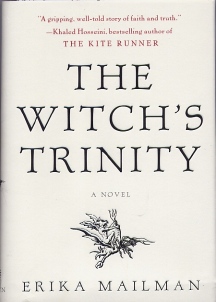 |
|
| Oh-so-litrary. |
And your concise introduction
to this novel is the wonderful interview with author Erika Mailman. She
has more experience of witches than most
of us; an ancestor of hers was tried for witchcraft and acquitted – twice.
She told me about reading the Malleus Maleficarum and actually brought
her heavily annotated copy to the interview. The title quote above comes
from when she was telling me about its despicable content. I aired this
interview on Halloween on KUSP in an edited form, and you can now hear
the "director's cut" as Erika called it in a glorious MP3 or
a stunted-but-DRMless RealAudio file.
Let me mention here that I'm considering punting the RealAudio format
come New Year's; those who wish me to continue
it are advised to email me; if you do, I will. Mailman gives a not-so-delightful
description of what a witch burning is like in 'The Witch's Trinity'.
I'd prefer not to experience the 21st century Internet version merely
because I got tired of doing "save as". But think of the symbolism.
Even as I type this file, I know it will have to be ... saved. But not
burned.
|
| |
|
|

